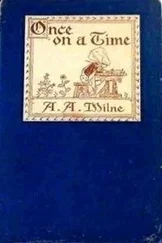Алан Милн - Once a Week
Здесь есть возможность читать онлайн «Алан Милн - Once a Week» весь текст электронной книги совершенно бесплатно (целиком полную версию без сокращений). В некоторых случаях можно слушать аудио, скачать через торрент в формате fb2 и присутствует краткое содержание. Год выпуска: 2014, Издательство: epubBooks Classics, Жанр: Юмористическая проза, на английском языке. Описание произведения, (предисловие) а так же отзывы посетителей доступны на портале библиотеки ЛибКат.
- Название:Once a Week
- Автор:
- Издательство:epubBooks Classics
- Жанр:
- Год:2014
- ISBN:нет данных
- Рейтинг книги:5 / 5. Голосов: 1
-
Избранное:Добавить в избранное
- Отзывы:
-
Ваша оценка:
- 100
- 1
- 2
- 3
- 4
- 5
Once a Week: краткое содержание, описание и аннотация
Предлагаем к чтению аннотацию, описание, краткое содержание или предисловие (зависит от того, что написал сам автор книги «Once a Week»). Если вы не нашли необходимую информацию о книге — напишите в комментариях, мы постараемся отыскать её.
Once a Week — читать онлайн бесплатно полную книгу (весь текст) целиком
Ниже представлен текст книги, разбитый по страницам. Система сохранения места последней прочитанной страницы, позволяет с удобством читать онлайн бесплатно книгу «Once a Week», без необходимости каждый раз заново искать на чём Вы остановились. Поставьте закладку, и сможете в любой момент перейти на страницу, на которой закончили чтение.
Интервал:
Закладка:
The Rt. Hon. Rupert Meryton, Tariffadical Member for Cricklewood (E.) rose to his feet amidst cheers.
"Mr. Speaker," he said, "I rise—er—to–night, sir—h'r'm, to—er―" So much of his speech I may give, but urgent State reasons compel me to withhold the rest. Were it ever known with which Bill the secret history that I have disclosed concerns itself, the Great Powers in an instant would be at each other's throats. But though I may not disclose the speech I can tell of its effect on the House. And its effect was curious. It was, in fact, the exact opposite of what Rupert Meryton, that promising Under Secretary, had intended.
It was the first speech that he had ever prepared himself. Than Rupert there was no more dignified figure in the House of Commons; his honour was proof, as we have seen, against the most insidious temptations; yet, since one man cannot have all the virtues, he was distinctly stupid. It would have been a hopeless speech anyhow; but, to make matters worse, he had, in the most important part of it, attempted irony. And at the beginning of the ironical passage even the Tariffadical word–painters had to confess that it was their own stalwarts who "suddenly paled."
As Lady Marchpane had said, it was bound to be a close thing. The Liberatives and the Unialists, of course, were solid against the Bill, but there was also something of a cave in the Tariffadical Party. It was bound to be a close thing, and Rupert's speech just made the difference. When he sat down the waverers and doubters had made up their minds.
The Bill was defeated.
That the Tariffadicals should resign was natural; perhaps it was equally natural that Rupert's secretary should resign too. He said that his reputation would be gone if Rupert made any more speeches on his own, and that he wasn't going to risk it. Without his secretary Rupert was lost at the General Election which followed. Fortunately he had a grateful friend in Lady Marchpane. She exerted her influence with the Liberatives, and got him an appointment as Governor of the Stickjaw Islands. Here, with his beautiful and rich wife, Sir Rupert Meryton maintains a regal state, and upon his name no breath of scandal rests. Indeed, his only trouble so far has been with the Stickjaw language—a difficult language, but one which, perhaps fortunately, does not lend itself to irony.
The Magnate
It was in October, 19— that the word "Zinc" first began to be heard in financial circles. City men, pushing their dominoes regretfully away, and murmuring "Zinc" in apologetic tones, were back in their offices by three o'clock, forgetting in their haste to leave the usual twopence under the cup for the waitress. Clubmen, glancing at the tape on their way to the smoking–room, said to their neighbours, "Zinc's moved a point, I see," before covering themselves up with The Times . In the trains, returning husbands asked each other loudly, "What's all this about zinc?"—all save the very innocent ones, who whispered, "I say, what is zinc exactly?" The music–halls took it up. No sooner had the word "Zinc" left the lips of an acknowledged comedian than the house was in roars of laughter. The furore at the Collodium when Octavius Octo, in his world–famous part of the landlady of a boarding–house, remarked, "I know why my ole man's so late. 'E's buying zinc," is still remembered in the bars round Piccadilly.
* * * * *
To explain it properly it will be necessary (my readers will be alarmed to hear) to go back some thirty years. This, as a simple calculation shows, takes us to June, 18—. It was in June, 18— that Felix Moses, a stout young man of attractive appearance (if you care for that style), took his courage in both hands, and told Phyllida Sloan that he was worth ten thousand a year and was changing his name to Mountenay. Miss Sloan, seeing that it was the beginning of a proposal, said hastily that she was changing hers to Abraham.
"You're marrying Leo Abraham?" asked Felix in amazement. "Ah!" A gust of jealousy swept over him. He licked his lips. There was a dangerous look in his eyes—a look that was destined in after days to make Emperors and rival financiers quail. "Ah!" he said softly. "Leo Abraham! I shall not forget!"
And now it will be necessary (my readers will be relieved to learn) to jump forward some thirty years. This obviously takes us to September 19—. Let us on this fine September morning take a peep into "No. — Throgneedle Street, E.C.," and see how the business of the mother city is carried on.
On the fourth floor we come to the sanctum of the great man himself. "Mr. Felix Mountenay—No admittance," is painted upon the outer door. It is a name which is known and feared all over Europe. Mr. Mountenay's private detective stands on one side of the door; on the other side is Mr. Mountenay's private wolf–hound. Murmuring the word "Press," however, we pass hastily through, and find ourselves before Mr. Mountenay himself. Mr. Mountenay is at work; let us watch him through a typical five minutes.
For a moment he stands meditating in the middle of the room. Kings are tottering on their thrones. Empires hang upon his nod. What will he decide? Suddenly he blows a cloud of smoke from his cigar, and rushes to the telephone.
"Hallo! Is that you, Jones?…What are Margarine Prefs. at?… What?… No, Margarine Prefs. , idiot…. Ah! Then sell. Keep on selling till I tell you to stop…. Yes."
He hangs up the receiver. For two minutes he paces the room, smoking rapidly. He stops a moment … but it is only to remove his cigar–band, which is in danger of burning. Then he resumes his pacings. Another minute goes rapidly by. He rushes to the telephone again.
"Hallo! Is that you, Jones?…What are Margarine Prefs. down to now?… Ah! Then buy. Keep on buying…. Yes."
He hangs up the receiver. By this master–stroke he has made a quarter of a million. It may seem to you or me an easy way of doing it. Ah, but what, we must ask ourselves, of the great brain that conceived the idea, the foresight which told the exact moment when to put it into action, the cool courage which seized the moment—what of the grasp of affairs, the knowledge of men? Ah! Can we grudge it him that he earns a quarter of a million more quickly than we do?
Yet Mr. Felix Mountenay is not happy. When we have brought off a coup for a hundred thousand even, we smile gaily. Mr. Mountenay did not smile. Fiercely he bit another inch off his cigar, and muttered to himself.
The words were "Leo Abraham! Wait!"
This is positively the last row of dots. Let us take advantage of them to jump forward another month. It was October 1st, 19—. (If that was a Sunday, then it was October 2nd. Anyhow, it was October.)
Mr. Felix Mountenay was sleeping in his office. For once that iron brain relaxed. He had made a little over three million in the last month, and the strain was too much for him. But a knock at the door restored him instantly to his own cool self.
"I beg your pardon, sir," said his secretary, "but somebody is selling zinc."
The word "zinc" touched a chord in Mr. Mountenay's brain which had lain dormant for years. Zinc! Why did zinc remind him of Leo Abraham?
"Fetch the Encyclopedia Britannica , quick!" he cried.
The secretary, a man of herculean build, returned with some of it. With the luck which proverbially attends rich men, Mr. Mountenay picked up the "Z" volume at once. As he read the Zinc article it all came back to him. Leo Abraham had owned an empty zinc–mine! Was his enemy in his clutches at last?
"Buy!" he said briefly.
In a fortnight the secretary had returned.
"Well," said Mr. Mountenay, "have you bought all the zinc there is?"
Читать дальшеИнтервал:
Закладка:
Похожие книги на «Once a Week»
Представляем Вашему вниманию похожие книги на «Once a Week» списком для выбора. Мы отобрали схожую по названию и смыслу литературу в надежде предоставить читателям больше вариантов отыскать новые, интересные, ещё непрочитанные произведения.
Обсуждение, отзывы о книге «Once a Week» и просто собственные мнения читателей. Оставьте ваши комментарии, напишите, что Вы думаете о произведении, его смысле или главных героях. Укажите что конкретно понравилось, а что нет, и почему Вы так считаете.












